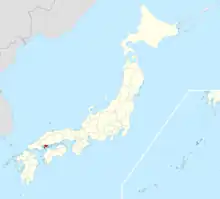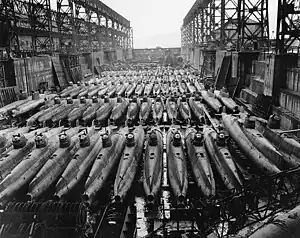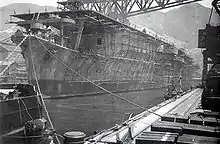

Kure Naval Arsenal (呉海軍工廠, Kure Kaigun Kosho) was one of four principal naval shipyards owned and operated by the Imperial Japanese Navy.
History
.jpg.webp)

The Kure Naval District was established at Kure, Hiroshima in 1889, as the second of the naval districts responsible for the defense of the Japanese home islands. Along with the establishment of the navy base, a ship repair facility was also constructed, initially by moving the equipment from the Onohama shipyards near Kobe. Construction was supervised by the French engineer Louis-Émile Bertin. The first warship constructed at Kure, Miyako, was launched in 1897. The "Kure Shipyards" were officially renamed the "Kure Naval Arsenal" in 1903.
Kure developed into one of the largest shipbuilding facilities in the Empire of Japan, capable of working with the largest vessels. The Arsenal included a major steel works (built with British assistance), and also facilities for producing naval artillery and projectiles. The battleships Yamato and Nagato were designed and constructed at Kure.
The facilities of the Kure Naval Arsenal were repeatedly bombed by the United States Navy and United States Army Air Forces during the Pacific War, and over 70% of its buildings and equipment was destroyed.
After the surrender of Japan in 1945, the Kure Naval Arsenal was turned over to civilian hands.
Current facilities
The extensive dry dock, ship building, repair and engineering facilities are now owned and operated by Japan Marine United, one of Japan's largest merchant marine and naval shipbuilders.
Examples of ships built at Kure Naval Arsenal
Battleships
- Yamato, Yamato-class battleship 1941
- Nagato, Nagato-class battleship 1920
- Settsu, Kawachi-class battleship 1912

Battlecruiser/Armoured Cruiser
Aircraft Carriers
- Katsuragi, Unryū-class aircraft carrier 1945
- Fleet Carrier Sōryū, 1937
- Un'yō, Taiyō-class escort carrier 1942
Cruisers
- 1 of 4 Takao-class heavy cruisers: Atago (1932)
- 1 of 4 Myōkō-class heavy cruisers: Nachi (1928)
- light cruiser Ōyodo (1943)
Destroyers
- Ariake, Fubuki, Arare, Harusame-class Destroyers 1905
Submarines
Seaplane Tenders
Naval Weapons designed at Kure
Naval Gun
- 40(46) cm/45 Type 94 naval gun, main armament of the Yamato-class Battleship
- 10 cm/65 Type 98 naval gun, main armament of the Akizuki-class Destroyer and Secondary armament of light cruiser Ōyodo and aircraft carrier Taihō
See also
References
- Hunter, Janet (2002). The History of Anglo-Japanese Relations, 1600-2000: Volume IV: Economic and Business Relations. Palgrave Macmillan. ISBN 0-333-79197-5.
- Samuels, Richard J. (1996). "Rich Nation, Strong Army": National Security and the Technological Transformation of Japan. Cornell University Press. ISBN 0-8014-9994-1.
- Schencking, J. Charles (2005). Making Waves: Politics, Propaganda, And The Emergence Of The Imperial Japanese Navy, 1868-1922. Stanford University Press. ISBN 0-8047-4977-9.
- Sims, Richard (1998). French Policy Towards the Bakufu and Meiji Japan 1854-1894: A Case of Misjudgement and Missed Opportunities. RoutledgeCurzon. ISBN 1-873410-61-1.
34°13′55″N 132°33′14″E / 34.232°N 132.554°E